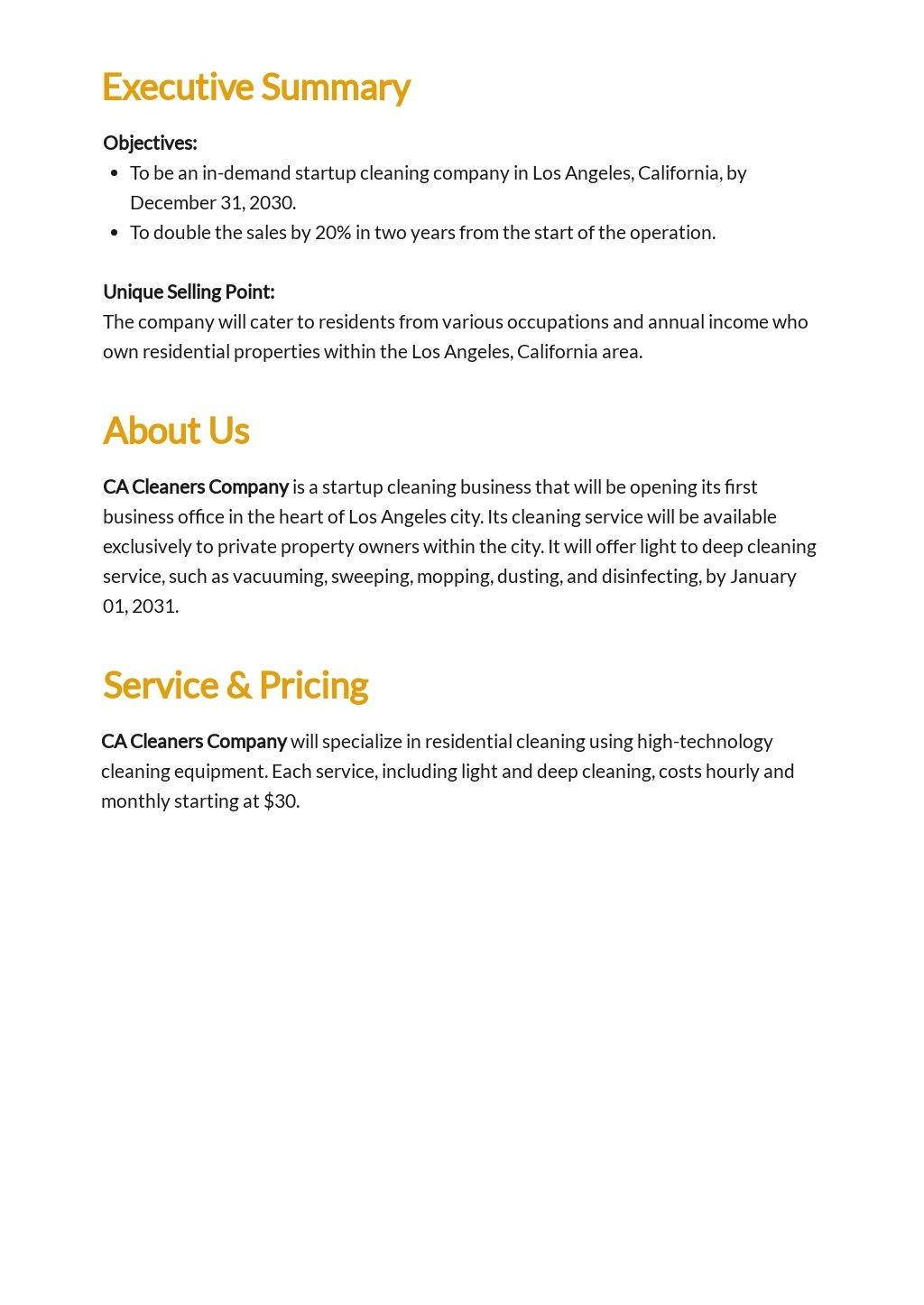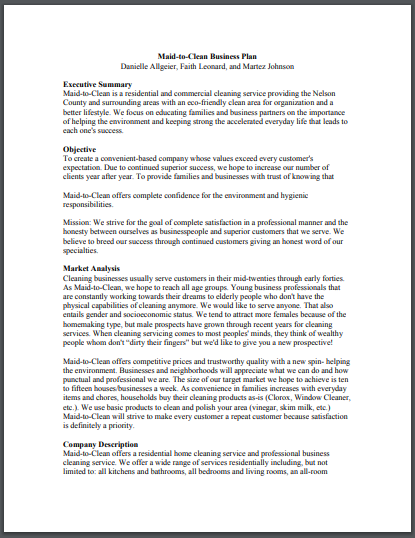The aroma of fresh linen, the gleam of polished floors, the satisfaction of a job well done – these are just some of the joys of running a cleaning company. But before you can enjoy those fruits of labor, you need a solid foundation: a well-crafted business plan. This document is more than just a formality; it’s your roadmap to success, outlining everything from your target market to financial projections.

Image: old.sermitsiaq.ag
The journey of building a flourishing cleaning company is exciting, but it requires careful planning. This guide will provide you with a comprehensive framework, outlining the key components of a compelling business plan and offering practical tips for creating your own. It’s time to turn your vision into reality, one clean space at a time.
Why a Business Plan is Crucial for a Cleaning Company
A business plan isn’t just a dusty document gathering cobwebs on a shelf. It’s a dynamic tool to help you navigate the complexities of running a cleaning company, ensuring you’re on the right track. It serves as your compass, guiding your decisions and offering a clear picture of your objectives and strategies. Without a business plan, you’re essentially cleaning without a map, potentially leading to lost time, effort, and financial resources.
Here’s why a business plan is essential for a cleaning company:
- Clarity of Goals: A business plan forces you to define your vision, mission, and long-term goals. What kind of cleaning services do you offer? Who are your target customers? Where do you see your company in five years?
- Market Research and Analysis: Identifying your ideal customer base and understanding their needs is crucial. A business plan requires you to conduct research, analyzing the competition, identifying your unique selling proposition, and developing strategies to attract clients.
- Financial Projections and Budgeting: A well-structured plan includes detailed financial projections. This involves forecasting your revenue, expenses, and profitability. By assessing your initial investment, you can create a budget that ensures your company is financially stable.
- Marketing and Sales Strategies: A business plan defines your approach to reaching customers. This includes outlining your marketing channels, pricing strategy, and sales tactics.
- Attracting Investors: In the early stages of your business, you may need funding from investors. A compelling business plan is essential for convincing them of your company’s potential for success.
Essential Components of a Cleaning Company Business Plan (PDF)
An effective business plan for a cleaning company must cover all the critical aspects of your operation, providing clear and specific details. Structure your plan using the following sections:
1. Executive Summary
This is a concise overview of your cleaning company, highlighting your core services, target market, and unique selling proposition. Think of it as the elevator pitch of your business. Keep it brief, impactful, and persuasive.

Image: sarseh.com
2. Company Description
This section describes your cleaning business in detail. Include:
- Business Structure: Are you a sole proprietorship, partnership, or LLC?
- Mission Statement: What is the core purpose of your cleaning company?
- Products and Services: What specific cleaning services do you offer?
- Target Market: Who are your ideal customers? (Residential, commercial, niche markets like pet-friendly homes)
- Competitive Advantage: What sets you apart from competitors? This could include specializing in green cleaning, offering eco-friendly products, or providing exceptional customer service.
3. Market Analysis
Conduct thorough research into your target market:
- Industry Overview: Explore the cleaning industry landscape, analyzing trends and growth opportunities.
- Customer Demographics: Define the characteristics of your ideal customer (age, income, lifestyle, and location).
- Competitive Landscape: Analyze your competitors: their strengths, weaknesses, pricing, and marketing strategies.
- Market Segmentation: Can you specialize in specific niches within the cleaning industry? (e.g., move-in cleaning, deep cleaning, commercial office cleaning).
4. Marketing and Sales Strategies
Develop a plan for reaching your target market and converting leads into paying customers:
- Marketing Channels: Identify the most effective channels to reach your customers, such as online advertising (Google Ads, social media), local listings (Yelp, Angie’s List), and community outreach.
- Pricing Strategy: Determine your pricing based on your costs, competition, and target market. Consider hourly rates, package deals, and special promotions.
- Sales and Customer Acquisition: Outline your approach to generating leads and converting them into customers.
- Customer Retention: Implement strategies to build long-lasting relationships with your clients.
5. Operations Plan
This section outlines the day-to-day operations of your business:
- Cleaning Procedures: Describe your standardized cleaning procedures and protocols.
- Team Management: Detail your hiring process, training program, and employee compensation.
- Equipment and Supplies: List the essential equipment and cleaning supplies needed for your services.
- Safety and Compliance: Outline your safety protocols and compliance with relevant laws and regulations (OSHA, EPA).
- Insurance: Specify your insurance coverage, including liability and worker’s compensation.
6. Financial Projections
Create detailed financial forecasts for the next 3-5 years:
- Start-Up Costs: Estimate the initial capital needed to launch your cleaning company (equipment, supplies, licenses, marketing).
- Revenue Projections: Forecast your expected revenue based on market research and anticipated customer acquisition.
- Expense Budget: Create a detailed breakdown of your expected expenses, including wages, rent, supplies, utilities, marketing, and administrative costs.
- Profitability Analysis: Calculate your projected profit margin and identify key profitability drivers.
7. Management Team and Organization
If you have partners, provide details about each team member’s roles, expertise, and experience.
8. Funding Requirements (if applicable)
If you need funding, outline your financing needs and proposed usage of funds. Include a clear plan for repayment.
9. Appendix
Include supporting documents (contracts, resumes, financial statements).
Tips for Creating a Winning Business Plan for Your Cleaning Company
Now that you understand the elements of a solid business plan, here are practical tips to make it stand out:
- Research and Analyze: Thoroughly study market trends, your target audience, and your competition.
- Be Specific and Measurable: Use clear language and quantify your goals. Don’t simply say “increase sales” – specify “increase sales by 15% in the next year.”
- Focus on Your Unique Selling Proposition: What makes your cleaning company stand out? Highlight your strengths and what sets you apart.
- Present Professional Formatting: Make your business plan legible and visually appealing. Use clear fonts, headings, and subheadings.
- Proofread Carefully: Errors in grammar and spelling can undermine your credibility.
Remember, your business plan is a living document. As your business evolves, your plan should adapt and reflect changes in your strategies, operations, and market conditions. Regularly review and update it to ensure it aligns with your current goals and objectives.
Frequently Asked Questions (FAQs)
Q: What business licenses and permits do I need to start a cleaning company?
A: The specific requirements vary by location. Contact your local government or a business licensing service for information on necessary permits and licenses.
Q: How much should I charge for my cleaning services?
A: Consider your costs, market competition, and target market. Research typical cleaning rates in your area and adjust based on your services and experience.
Q: How do I get clients for my cleaning company?
A: Leverage online marketing (Google Ads, social media), local listings (Yelp, Angie’s List), community outreach, and networking. Offer introductory discounts or promotions to attract new customers.
Q: What are some essential cleaning supplies for a cleaning company?
A: This depends on the specific services you offer. Common supplies include cleaning solutions, microfiber cloths, vacuums, mops, buckets, brooms, and cleaning tools.
Q: How do I manage my cleaning company’s finances effectively?
A: Use accounting software to track income and expenses, create a budget, manage payroll, and ensure financial stability. It’s also essential to understand your tax obligations and file your taxes on time.
Q: Should I hire employees or work as a sole proprietor?
A: This depends on the scale of your business. If you’re starting small, working as a sole proprietor can be cost-effective. As your business grows, hiring employees may become necessary to handle increased workload.
Business Plan For Cleaning Company Pdf
Conclusion
Creating a well-crafted business plan is a crucial step towards building a successful cleaning company. It provides the clarity, direction, and financial framework needed to navigate the complexities of the industry. Remember, your business plan is your roadmap to success. By thoroughly researching, planning, and executing your strategies, you can transform your cleaning dream into a thriving reality.
Are you ready to embark on this journey? Do you find this guide helpful in creating your own business plan for your dream cleaning company?






